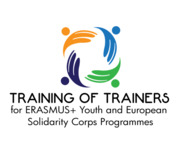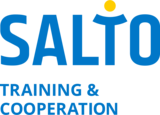Training of Trainers (ToT)
Within the ToT course, participants have the chance to further develop their competences as a trainer. In line with the European Training Strategy, ToT considers the following competences as essential when working as a non-formal education trainer within Erasmus+ Youth field and European Solidarity Corps.
- Understand and facilitate individual and group learning processes
- Design educational programmes
- Direct one's own learning (Learning to Learn)
- Co-operate successfully in teams
- Communicate meaningfully with others
- Intercultural Competence
- Being civically engaged
Participants enter the ToT course from various levels of prior experience and bring along a portfolio of competences - consequently, their learning needs are different. The educational approach implemented in the ToT course intends to allow for these different learning needs to be identified and pursued. At the core of this process is the competence of the participant to direct his/her own learning. The group as a source for peer learning and the trainers as facilitators of these learning processes are essential pillars of this approach.
The ToT course lasts nine months and consists of:
- three residential seminars
- an international training course you design and run with other participants
- ongoing e-learning
- ongoing mentoring with one of the course trainers as your mentor
- learning commitments
This course requires participants to invest a considerable amoung of time. In total you should allow for at least 55 days:
- 24 seminar days (including travel)
- 16 days overall for the Training Practice Course (preparatory work, prep meeting and the course itself)
- 16 days (on average 1-2 days per month) for following the personal learning commitments, the online work, peer learning, mentor talks etc.
Participants profile:
- To be able to attend and deliver training courses in English;
- To have been already involved at least three times in a team of trainers designing, implementing and evaluating a training course in the framework of Non-Formal Education;
- To have had international experience in the youth work field with a function of responsibility (not only as a participant) – organising international youth projects, leading a youth exchange, mentoring volunteers, etc;
- To be ready and willing to develop training competences and act after the course as a trainer for European Erasmus+ Youth or European Solidarity Corps projects and/or for training courses organised by the National Agencies of the programmes;
- To show initiative and willingness to self-direct their learning process and contribute to other participants' learning journeys;
- To be prepared to reflect on and question their own beliefs and approaches as trainers.
The ToT courses are delivered by a European trainers team consisting of Anita Silva, Salvi Greco and Gabi Steinprinz.
-------------
IMPORTANT TO KNOW
Further information need to be checked by you in advance with the sending National Agency (= the country you live in)
1. For this ToT, for different reasons not all the National Agencies of the Erasmus+: Youth and European Solidarity Corps Programme decide to send participants. The applicants will be selected by the sending NAs, not by the SALTO T&C RC because NAs cover the expenses related to the participation in the course (travel, board and lodging, trainer fees, etc). Participation fees to join this ToT differs from country to country.
2. Some sending NAs have additional national selection priority (such as only members of the NA trainer pool will be selected) but which develops over time and cannot be listed here properly at this page or in the common European call for applicants.




Salvi Greco
